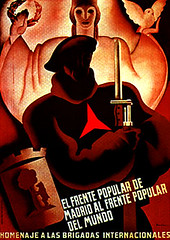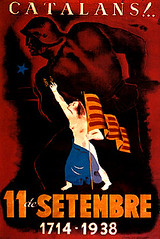"At 50, everyone has the face that he deserves." -- Last Literary Notebook (
The Complete Works of George Orwell, ed. Peter Davison, Volume 20, 213)
"But one look at the guy's
picture: and you can tell it's not going to be easy to pin the "radical right" label on him." -- Billmon, 7/20/05
"No guilty person is ever punished. So far as subjective feelings go, a person who is in a position to be punished has become the victim, & has therefore become innocent. This is perfectly well understood, internally, by everyone concerned. When a murderer is hanged, there is only one person present at the ceremony who is not guilty of murder. The hangman, the warders, the governor, the doctor, the chaplain -- they are all guilty: but the man standing on the drop is innocent. Everyone who has ever seen an execution knows this, & indeed even the public which gloats over the reports in the News of the World knows it after a fashion; the vast bulk of what is said & written in favour of capital punishment is simply a hypercritical cover for continuing to enjoy the pleasures of
being guilty and indulging in murder, while remaining respectable." -- Last Literary Notebook,
ibid."With the blessings of the Bush White House, a team of conservative leaders self-dubbed 'the four horsemen' formed in 2002 and has taken over much of the planning for the nomination fight. These men are C. Boyden Gray, an establishment lawyer who chairs the Committee for Justice; Jay Alan Sekulow, chief counsel for the American Center for Law and Justice; Leonard A. Leo, executive vice president of the Federalist Society; and Edwin A. Meese III, attorney general during part of the Reagan administration.' --
The Washington Post, "The Right's Moment, Years in the Making," Thomas B. Edsall and Dana Milbank,
7/3/05"You don't have many suspects who are innocent of a crime. That's contradictory. If a person is innocent of a crime, then he is not a suspect." -- Edwin Meese,
U.S. News and World Report, 10/14/85

